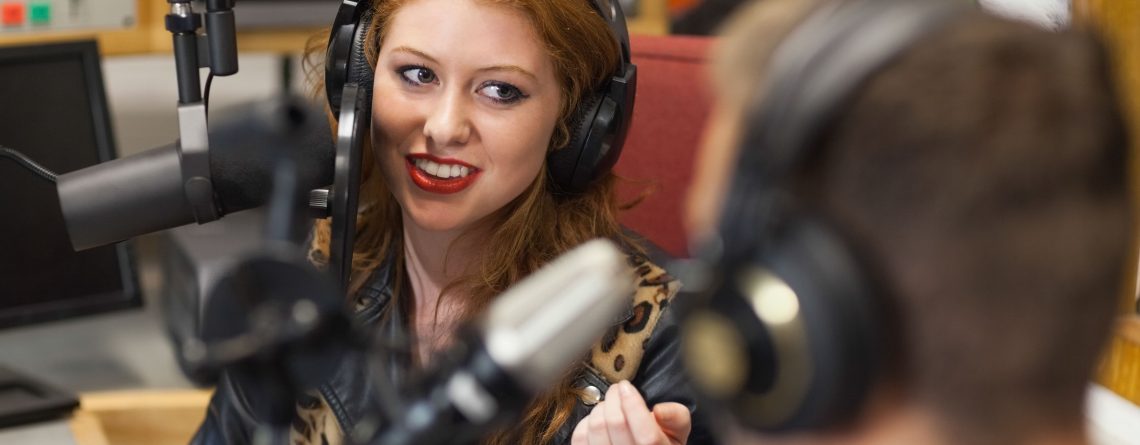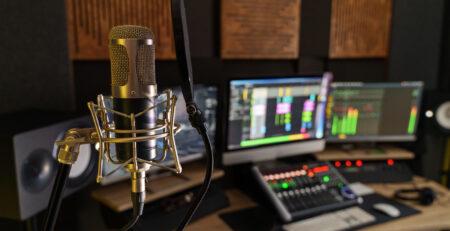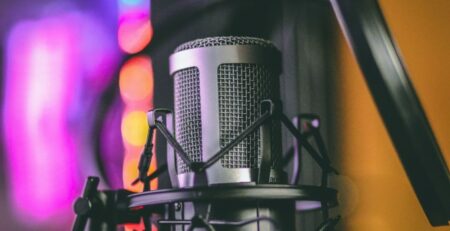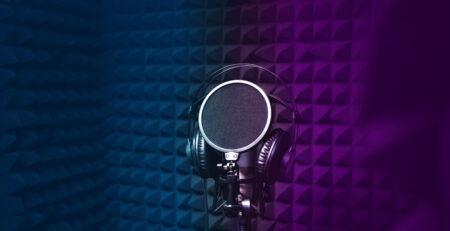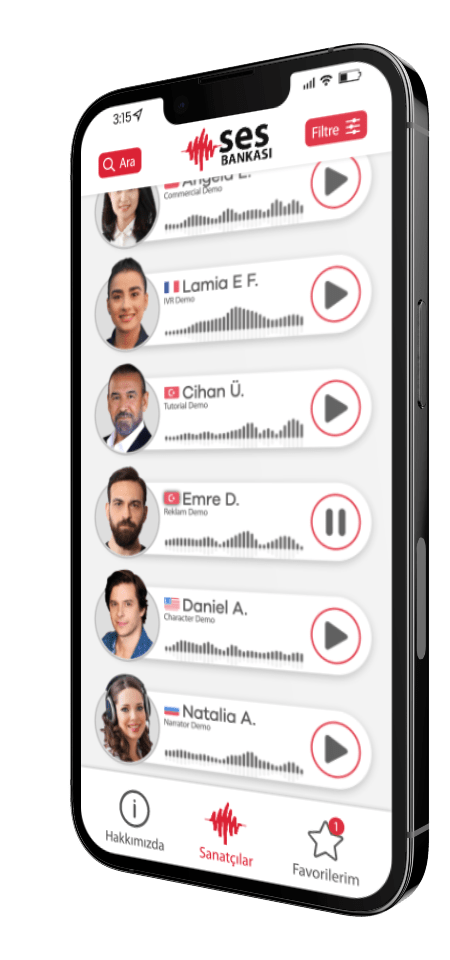The Rise of Podcast Voice Over
While our world has begun to change rapidly and move to a different dimension with communication tools, an old but stubbornly rising trend draws attention: “Podcast broadcasting”, of course, then “podcast voiceover”. Podcast dubbing offers us podcasts that we enjoy the old days, no matter how our communication world expands. Even the spread of communication from radio to the Internet in the 21st century has not forgotten the popularity of podcasting.
Radio broadcasts were considered by us at the time to be a brilliant invention that allowed the world to connect and communicate over long distances. However, even many years after radio's development, it took time for this channel to become a mainstream. But in today's world, it's hard to find someone who hasn't experienced this channel.
Afterwards, we started to follow the returns of the new era, which became widespread with the television era, which quickly took the throne of the radio, and the internet era that followed, with excitement. As it is known, with the rapid spread of the internet, it is no longer a dream to open a video channel with unique concepts and appeal to millions of people. So much so that, thanks to this video age, which has become widespread, many new occupational groups have been formed. People are doing their best to produce new video content by working privately - maybe by forming a team - to become more professional. But
So, how did the "Podcast", also called the new generation "internet radio stations", which started to spread from America to the world and attracts increasing attention in our country, emerged, what is it, how is it made / voiced?
The Emergence of Podcast and Brief History of Podcast
First of all, let's talk about where the podcast got its name. Although not as popular as the iPhone today, in the 2000s the iPod was the best Walkman of the era for music lovers. In 2004, journalist Ben Hammersley combined the iPod's "Pod" with a broadcasting term, "broadcast", and audio broadcasts became "podcasts" thanks to him.
The podcast world is the product of a revolutionary change that occurred in the technology and publishing industry in the early 21st century. Podcasting, whose name is derived from the combination of Apple's famous iPod device and the word 'broadcast', emerged as a format that enables the distribution of digital audio and visual content over the internet. But if we dig into the roots of this media phenomenon, we can see the role played by various factors, such as the spread of broadband internet and the popularization of digital media players.
In 2004, the word “podcast” was first used in an article in The Guardian newspaper, helping this new genre gain attention and grow. However, the real boom of podcasting came in 2005 when Apple added podcast support to its iTunes software. This move allowed users to easily find, subscribe and automatically download podcasts, which greatly increased their popularity.
The birth of the podcast can be seen as a paradigm shift in broadcasting in general. Unlike traditional media outlets, podcasts have made it possible for anyone to tell their story and reach a wide audience around the world, thanks to low costs and easy accessibility. Additionally, podcasts have provided a platform for users to listen whenever and wherever they want, making them different and attractive from other media formats.
Especially in recent years, podcasting has become a rapidly expanding industry. TOThere are millions of podcasts covering topics ranging from education to entertainment, storytelling to business strategies. In addition to providing listeners with the opportunity to learn and be entertained, podcasts have also become a valuable marketing tool for brands and businesses.
Podcasting is a product of the digital age and has emerged as a result of rapidly changing technology and consumer habits. It has not only provided a democratic and accessible platform for anyone who wants to have their voice heard, but has also created a unique environment for education, entertainment and knowledge sharing.
Podcasts' ability to host many different types of content makes them appealing to all types of listeners. Anyone can find a podcast on almost any topic, from documentary-style podcasts to self-help talks, comedy shows to science and technology. Additionally, podcasts dedicated to a particular industry or hobby allow a particular community to share common interests and address needs that are often not met through other forms of media.
As technological advances continue, podcasting continues to evolve. Increasingly, podcasts are starting to use new technologies such as virtual reality (VR) and extended reality (AR).. These technologies provide podcast listeners with greater interactivity and greater immersion in their experience.
What is Podcast?
The primary function of a podcast is conversations, conversations, or "voice-overs", about people's different interests, rather than music, and is usually prepared in episodes.
Podcast, which we can define as a modern type of radio that you can listen to online/offline from your computer or phone, is actually more than just a radio. Because podcasting is not only limited to audio, it can also be video. However, listening is more preferred because, as a result of the new living conditions, people tend to do more than one thing at the same time, instead of focusing and watching videos, they can do their main work and get information about a subject of their interest with a conversation that remains in the background. They may be. For example, road trips are perfect times for this. This time frame is one of the most common ways people listen because driving around doing nothing is seen as a waste of time.
Of course, since you can't watch video there either, the audio content is excellent. Likewise, podcasts are a great option while working out at the gym, hiking, mowing the lawn, or on your commute. In short, any moment when the time spent seems futile can be a moment gained for sounds that will entertain and educate us!
How to Make / Voice a Podcast?
If you want to be a "podcaster" podcast voiceover After determining the subject, you can immediately start recording using your smartphone's voice recorder or with a microphone that you can use for recording on the phone and computer. Or you can do voiceovers for your own podcast by renting a suitable studio environment.
We can list the basic stages of podcast production as follows:
- Topic Selection: The first step in creating your podcast is to determine what you will talk about. The topic should be something that will interest your audience and that you are passionate about.
- script Preparation: Although it may seem like a spontaneous conversation, most podcasts have a specific script or structure. As you prepare your script, think about how you will organize your episodes, which topics you will cover when, and which guests you will host and when.
- Equipment Selection: You'll need a quality microphone and audio editing software to record your podcast. Equipment selection greatly affects the audio quality of your podcast.
- Record: The recording process involves recording your speech into the microphone and then editing this audio recording. At this stage, it is important to minimize background noise and obtain a clear audio recording. In this respect Voice Over Studio Check out our content.
- Distributing Records; Spotify, soundcloud Although you may have to work a little to regularly upload it to iTunes, where the podcast was born, and reach different audiences, there are paid or free services for all of them. So how is it that podcasts, which some of us don't even understand what they are, are increasing their number of listeners day by day?
Why is Podcast on the Rise?
“Are you listening to the podcast?” For the answer to the question, we can look at the results of Edison Research's "The Podcast Consumer 2019" research on podcast listeners in America.
According to Edison Research's "Share of Ear" research, which has been tracking all forms of online and offline listening since 2014, podcast listeners have increased significantly in the past year.
Again, according to the research, 51 percent of Americans over the age of 12 listened to podcast broadcasts, whose listening rates have doubled in the last five years, at least once in 2018. Although there was an increase in all demographic data, most of the increase came from listeners aged 12-24.
In light of the research of Nielsen and Edison Research, until last year, a total of 18.5 million podcast episodes were broadcast, but this year the number increased to 34 million. According to TechCrunch, podcast revenues were $314 million in 2017, and the expectation is $659 million in 2020.
Among the reasons why the podcast is on the rise; Undoubtedly, we can say that thanks to the ease of doing it in the background as a second job and the possibility of easily finding the desired program in any subject, it is easy to access information quickly. Thus, people have the opportunity to learn by just listening to a scientific research that they can learn by reading pages and hours.

